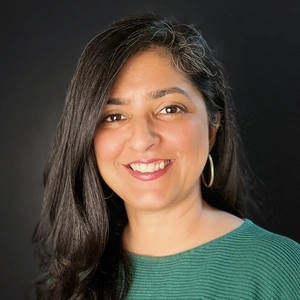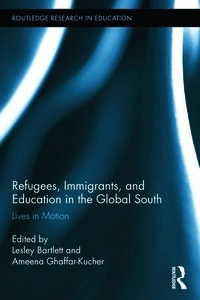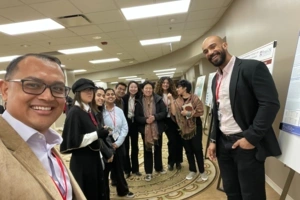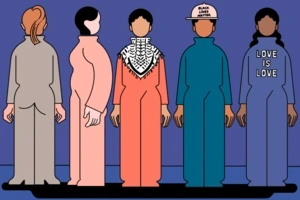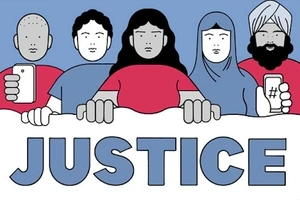Biography
Dr. Ameena Ghaffar-Kucher is the Director of the International Educational Development program at the University of Pennsylvania, specializing in the intersections of migration, education, and social justice. Her work examines the educational experiences of migrant youth, transnationalism, and the role education plays in shaping civic and social belonging.
She began her graduate studies in school psychology, earning a professional diploma in school psychology and a master’s in the psychology of bilingual students from Fordham University’s Graduate School of Education. As a school psychology resident, she worked with South Asian heritage students at a public high school in Rockland County, New York. Her interest in migrant youth deepened during her doctoral studies in international educational development at Teachers College, Columbia University, where she pursued a concentration in curriculum and pedagogy. At Teachers College, she served as the ethnographer for the Muslim Youth in New York City Project (funded by the Ford Foundation) and contributed to the African Muslim Immigrants Literacy Initiative (AMILI).
Her scholarship focuses on migration, displacement, and education, with particular attention to immigrant and refugee youth in the US. She is the coeditor of the award-winning volume Refugees, Immigrants, and Education in the Global South: Lives in Motion (2013, Routledge), recipient of the Comparative and International Education Society’s Jackie Kirk Outstanding Book Award. Her research has appeared in leading academic journals, including American Educational Research Journal, Harvard Educational Review, Ethnic and Racial Studies, Race, Ethnicity & Education, International Journal of Qualitative Studies in Education, and The Urban Review.
Dr. Ghaffar-Kucher has served on the board of directors for the Comparative and International Education Society and the Pennsylvania Council of International Education and was an advisory board member for MTV’s "Look Different" campaign. She is currently an editorial board member for Contingencies: A Journal for Global Pedagogy, and previously served as associate editor for Anthropology and Education Quarterly. She also currently serves as a faculty affiliate for the Asian American Studies program, the Middle East Center, and the South Asia Center at Penn, as well as the Center for Security, Race and Rights at Rutgers University. She has developed and taught courses at Drexel University and Teachers College, Columbia University. Before moving to the US to pursue her graduate studies, she lived in Hong Kong, Pakistan, and Germany—experiences that continue to inform her global perspective on migration and education.
Education
- Ed.D. (International Educational Development) Teachers College, Columbia University, 2008
- P.D. (School Psychology) Fordham University, 2003
- M.S.Ed. (Psychology of Bilingual Students) Fordham University, 2003
- B.S. (Psychology, International Management Studies) University of Maryland at Schwäbisch Gmünd, Germany, 1999
Areas of Expertise
- (Im)migrants and schooling
- Civic engagement
- Anti-Muslim racism/Islamophobia
- Citizenship and trans/nationalism
- Curriculum and pedagogy in international contexts
- School climate
- Educational development discourse
- Professional development
More Information
Academic Programs
International Educational Development, M.S.Ed.Research Interests and Current Projects
Dr. Ghaffar-Kucher’s research examines how schooling shapes the social and political identities of migrant youth. Her scholarship contributes to research on migration, citizenship, and transnationalism in education, and informs curriculum development, educator professional development, and broader conversations on education and social justice. A leading expert on structural Islamophobia, her work also analyzes how schools and policies perpetuate anti-Muslim racism and how educators can challenge these structures. She has led workshops across the US on fostering inclusive learning environments and countering Islamophobic narratives in education.
She co-led a Spencer Foundation-funded national study on the civic engagement of Muslim immigrant youth in the US, examining how they navigate belonging, identity, and political participation in the aftermath of 9/11. The findings are publicly available on an interactive GIS-based website, muslimamericanyouth.org, which maps these youth’s experiences & perspectives while situating them within a broader historical context.
Dr. Ghaffar-Kucher has spearheaded multiple curriculum and educator professional development initiatives that connect research and practice, collaborating with various national and international organizations. Her work focuses on uncovering hidden histories and amplifying the perspectives of those often left out of mainstream curricula. Through these efforts, she has developed resources that challenge dominant perspectives; make visible the experiences of communities in the margins; and inform professional development workshops that help educators incorporate these perspectives into their teaching. Her curricular projects have explored these themes in contexts ranging from early 20th-century South Asian American histories to the modern Middle East and contemporary experiences of AMEMSA youth. Currently, she directs the Teaching Beyond September 11th curriculum project, funded by the Penn Global Research & Engagement Grant Program. With a reach spanning over 100 countries, this multi-modal, open-access curriculum provides high school and college educators with over 40 lessons exploring the global impact of 9/11 while centering the experiences of impacted communities.
In addition to her academic work, Dr. Ghaffar-Kucher is the co-producer and host of The Parent Scoop podcast, which ran for three seasons. Geared toward parents and caregivers, the podcast featured conversations with researchers and practitioners in education, bridging scholarship and parenting to provide accessible, research-based insights. While currently on hiatus, the series remains a valuable resource for families seeking to navigate educational challenges with evidence-based perspectives.
Journal Editorial Boards
Contingencies: A Journal of Global Pedagogy
Editorial Board
